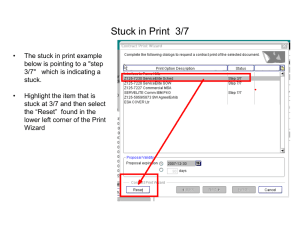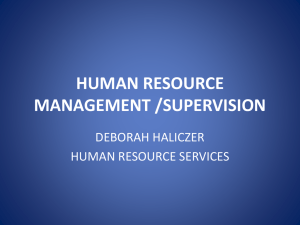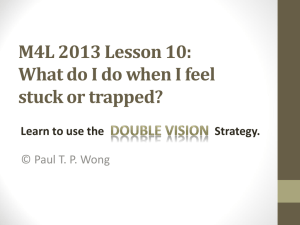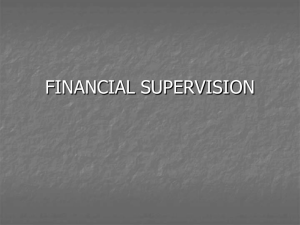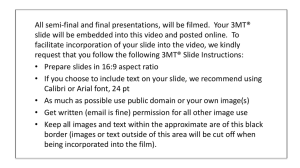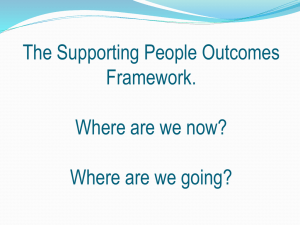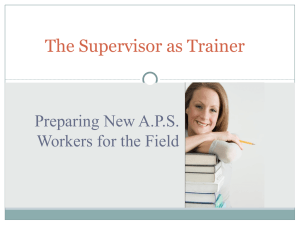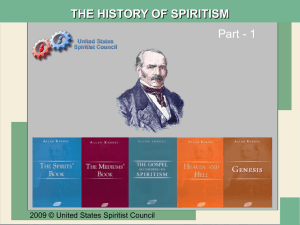Blanchard`s Management Matrix
advertisement
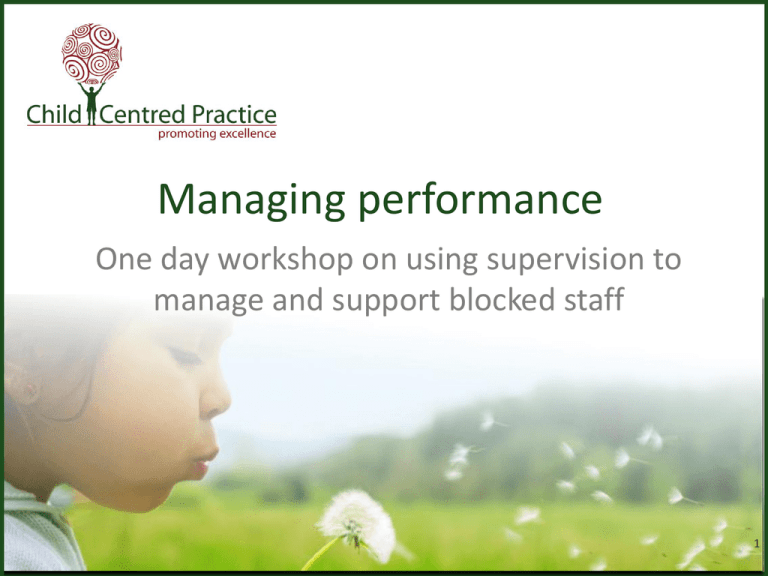
Managing performance One day workshop on using supervision to manage and support blocked staff 1 The agenda • • • • • • • • 1. The supervision climate How does the agency context impact? On you, on the workers, on the clients? How do you manage change? How are you managing your team through change? 2. How are we actually supervising? What does a worker experience when they come to you for supervision? What are your areas of strength? What do you need to build on? Blanchard 4 management styles – where do you spend most of your time? Reflectiveness scale for adults 3. What happens if a worker gets stuck? Do we recognise the blocked cycle? Narration exercise 4. How can we get workers unstuck? Common issues checklist, unblocking strategies, bridging interviews 5. The emotional cost – look at transference and Professional accommodation syndrome Jo Fox April 2011 2 Understanding the blocked cycle within the context of your organisation and yourself The most important tool Positive expectation approach • • • • • • • • Staff want to do a good job. No-one wants to be ineffective. People work best when they have clear targets in view. People can and will try to change if it makes sense to them. Performance can be improved if weaknesses are identified and worked on together. It is the behaviour and not the personality that needs to change. Paying attention to worker self esteem and self efficacy are crucial in helping them deal with criticism. Health dissonance creates the conditions for change. Agreed action on improving performance enhances commitment and trust. Complex interactions Individual J fox April 2011 Organisation 6 Source and nature of authority Role Authority • People resources finance • Given by senior management Professional Authority • Demonstrated competence, knowledge, skills • Gains credibility Personal Authority • Attitude to authority and response to authority of others • Gains leadership J Fox April 2011 7 Types of power base • Reward power = the ability of the supervisor to take & give away • Coercive power = the ability to punish & reprimand • Legitimate power = the right of one’s position & office • Expert power = the use of superior knowledge & skills • Referent power = where others seek the leaders approval • Information power = to give, withhold, or filter information • Connection power = perceived to be close contact with influential people • Ascribed power = accurate or distorted attributions of power ascribed to the supervisor J Fox April 2011 8 Supervisory authority • Power must be exercised in a legitimate, clear and consistent manner so that the authority is both trusted and experienced as enabling of the task the worker is trying to achieve. • It involves emotional containment, setting of boundaries, establishing limits and confronting blockage and boundary breaches J Fox April 2011 9 6 elements of legitimacy 1. 2. 3. 4. 5. 6. Representation Consistency Impartiality Accuracy Correctability Ethicality J Fox April 2011 10 Fantasised ‘bad supervisor’ 11 Fantasised ‘good supervisor’ 12 Authoritative supervision • Promotes critical thinking • Is delivered by supervisors with a strong professional knowledge and practice base • Is based on the supervisor’s awareness of their own impact on the supervisory process, and willingness to reflect on this • Facilitates a culture of opportunity in which the social worker can develop specialist knowledge, and/or be involved in innovative work/roles The Tannenbaum and Schmidt Continuum 14 Blanchard Management Matrix 15 Exercise one Blanchard’s Management Matrix • Identify your supervisory style using the 4 box matrix. J Fox 2011 16 Exercise Two Reflectiveness scale for adults • Attachment literature and practice suggests that one of the strongest predictors of a securely functioning individual is their ability to reflect. • This tool has been developed to help you think about the degree to which you know yourself. It can also be used to get feedback from supervisees on how you are perceived in the workplace. J Fox 2011 17 Blocked cycles 18 Stuck in EXPERIENCE Stuck in BLOCKED ACTIVE EXPERIMENTING CYCLE Stuck in REFLECTION Stuck in ANALYSING 19 Exercise three– The blocked cycle • Each group to consider one blocked area. • How would the worker feel if they were stuck in this stage? • How would they present in supervision, with the service user, in team meetings, with other agencies? 20 Exercise three Area of block Impact on observation/ engagement Impact on reflection Impact on analysis Stuck in experience Stuck in reflection Stuck in analysing Stuck in active experimenting 21 Impact on planning and action Performance area Range of potential consequences Role clarity Confusion/looseness selective/rigid avoidant/disengaged Partnership Collusive/enmeshed Paternal/dependant disengaged/lip service Response to authority Dependant Avoidant/ambivalent conflictual/controlling Planning Lack of clear goals/ Chaotic inconsistent/ inappropriate inflexible Observation Subjective/selective superficial/avoidant absent or irrelevant to task interventions Inappropriate or Lack of focus unpredictable controlling/directive Anti discriminatory practice Unaware rigid, judgemental intellectual only Task completion Chaotic, reactive Unfocused selective, being carried by others avoidant, low output disorganised Team/other relationships Insensitive Poor boundaries inappropriate avoidant, distant unaware of others intolerant, demanding, manipulative Empathy and self awareness Self pre-occupied Project feelings Onto others low self-awareness avoidance of feelings superficial inaccurate readings of others feelings Response to change Passive Helpless No responsibility avoidant denial of need for change resists change 22 rigid or conflictual not open to reason Generating responses • You need to be seen as part of the solution not the problem • Motivating your workers to address there issues requires the same set of skills you use when working with service users 23 Narration exercise to explore blocked performance 24 What is on your side? Organisationally Personally • • • • • • • • • • • Performance management framework Written supervisory contracts Observation auditing of performance by supervisor Supervisors knowledge of the worker Supervisor time and energy Managerial support Emotional support for supervisors • • • Confident in role Comfortable with organisation goals Perceived as competent Comfortable with power and authority Good reflective practice base Other areas of life not impacting on work role Up to date knowledge and skills 25 Common barriers • • • • • • • • • • • Lack of regular auditing or appraisal Absence of standards or competences against which performance can be measured Inadequate advice from the personnel function in the agency Lack of managerial support for the supervisor or recognition of the emotional demands of managing such situations Fears around acting oppressively leading to certain groups of staff being under-managed Over-accomodation to the personal difficulties a worker is having Low level complaints being dismissed: ’she is always whingeing’ Workers being moved from one team to another or out to training Recruitment and probationary processes fail to identify those who are clearly unsuitable for working in a high pressure social care environment No policy on management of under-performance Disagreement as to what counts as evidence especially around team and colleague behaviours. 26 Effective problem solving occurs when: • We share perceptions and build agreement about the nature of the problem • Explore the fears and fantasies attached, either to the nature of the problem or its possible solutions • Identify the beliefs, values and assumptions which each bring to the problem • Generate achievable options for change 27 Giving feedback • • • • • Planned Clear and owned Regular, consistent and soon Balanced Specific and behaviour focused 28 Bridging interviews 29 Three stages 1. Establishing the gap 2. Exploring and understanding this gap 3. Eliminating the gap 30 Remember 1. 2. 3. 4. The interviewee may react negatively at first Listening is as important as talking Bridging interviews are not the same as counselling Expect to learn about the interviewee and the agency 5. The bridging interview requires follow up 6. Preparation is the key 31 The emotional cost • “Inquiry reports tend to underestimate the impact of clients on professionals” • “anxiety about managing uncertainty has supported the creation for a performance management culture…..ultimately distanced from learning and reflective practice” 32 33 The professional accommodation syndrome explained 1. 2. 3. 4. 5. Secrecy Helplessness Entrapment and accommodation Delayed or unconvincing disclosure Retraction 34 Ten steps for sustaining supervisors 35 Reflective Supervisory Cycle Negative Supervision Cycle Thank You Jo Fox Child-Centred Practice Ltd jfox@childcentredpractice.co.uk www.childcentredpractice.co.uk Again our thanks to Tony Morrison for the use of materials from his book Staff Supervision in social Care, Pavilion Publishing, 2001
